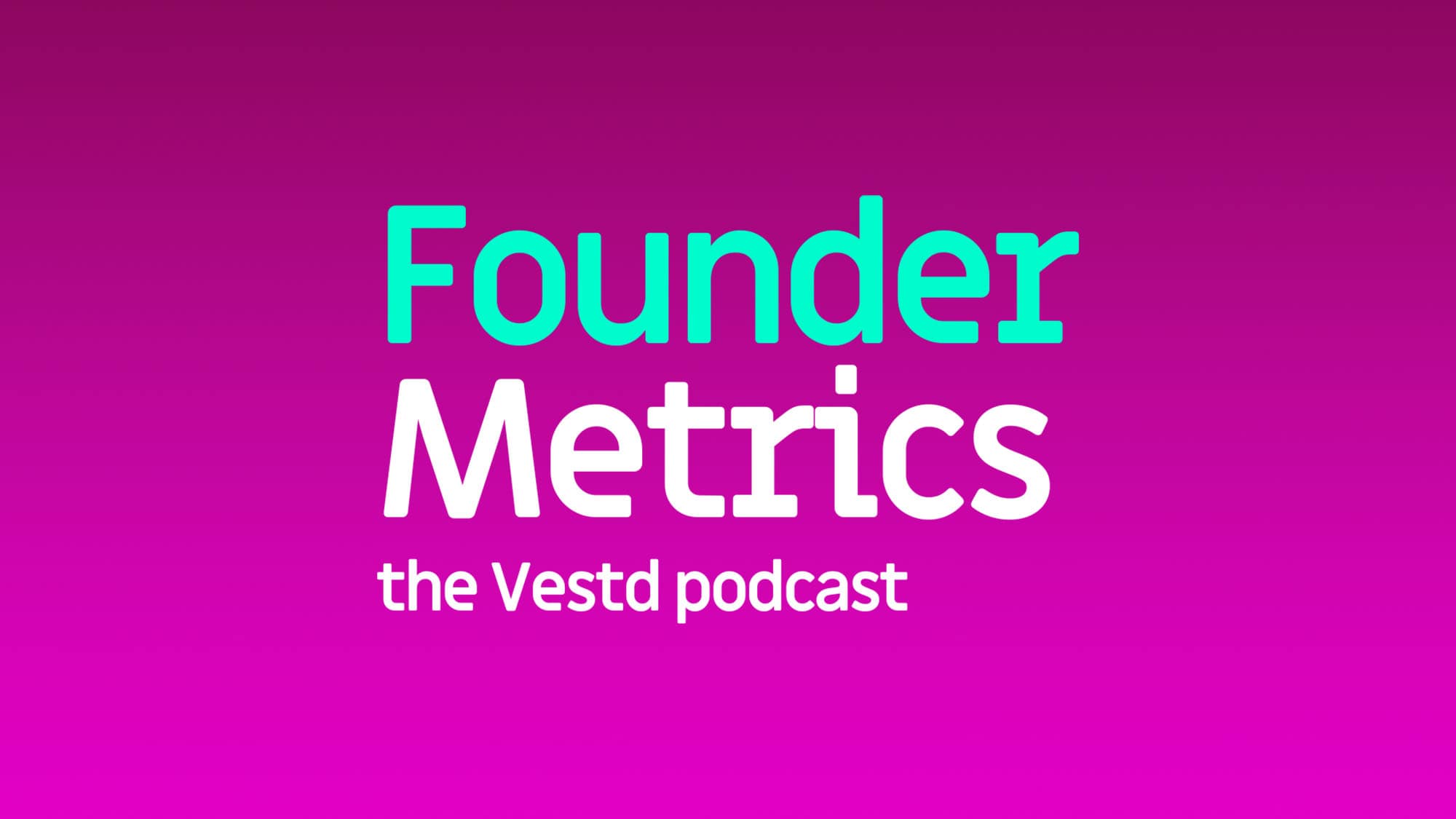Empowering entrepreneurs: top takeaways from FounderMetrics
FounderMetrics: a podcast by Vestd. Join Ifty Nasir as he uncovers the factors that forge success and those that spell disaster.
Manage your equity and shareholders
Share schemes & options
Equity management
Migrate to Vestd
Company valuations
Fundraising
Launch funds, evalute deals & invest
Special Purpose Vehicles (SPV)
Manage your portfolio
Model future scenarios
Powerful tools and five-star support
Employee share schemes
Predictable pricing and no hidden charges
For startups
For scaleups & SMEs
For larger companies
Ideas, insight and tools to help you grow

Last updated: 16 July 2024.
Introducing FounderMetrics: the brand new podcast hosted by founder and CEO Ifty Nasir. FounderMetrics delves deeply into the metrics that truly matter to equip you with the knowledge you need to make mighty decisions.
We hope Ifty’s candid conversations with the UK’s biggest business brains will motivate you to smash your goals! Joining Ifty for the very first episode is Piers Linney, an accomplished banker, venture capital lawyer, entrepreneur and former Dragon’s Den investor.
To listen to the podcast in full click here. It was so good we had to turn it into a two-parter!
Nevertheless, we've tried to distil the best insights in one place. From the astonishing speed of AI to the metrics that actually tell a story, here are our key takeaways from Ifty and Piers' chat.
I think people have this idea that I’m just this fast-talking bloke off the telly, but actually, I grew up in the North of England, I’m mixed heritage - my Mum’s from Barbados, my Dad’s from Manchester - and ever since I was a kid at a local comprehensive school in a mill-town, I wanted to go into business.
I managed to get into university, and became a lawyer in the city, and that’s already quite a journey considering where I came from. From there, I became an investment banker at Credit Suisse, then I branched out into business: dot coms, technology, media, telecoms, web 1.0, and finance.
And I’ve been involved with and invested in a variety of businesses ever since.
So, when I got started, my degree was in accounting and I understood the logistics of things like balance sheets and cash flows. But working as a banker and a venture capital lawyer really gave me an understanding of how you apply that in the world.
Building off that practical experience, I would say the question is, “What are the numbers you believe this business can produce over a period of time? And, from there, what sort of valuation metrics?
Whether it’s comparable analysis, DCF, or economic value added (the list could keep going!), what are you using? What multiples can you then apply to those numbers to achieve a valuation you believe in? What are the metrics that mean that you're on track, you're on time, your materials are right, your costs are good, sold right?”
From my perspective as a banker, although I can still write complicated financial models (for my sins!), it’s not because you’re trying to pin down that number. What you’re really trying to understand is, ‘What are the levers?'
When you’re building models – whether it’s business models or financial models – it’s really the logic that matters more than the model.
Don't get lost in the numbers, get lost in the logic.
What you really want to know is something like, “If I pull this lever here, if I can negotiate another 2% of my suppliers, increase my margin here, does that fall straight through to the bottom line? If I do, what's that bottom line look like and if I apply this multiple, what value does it create?”
So that's the thing that people, often, kind of miss is don't get lost in the numbers, get lost in the logic.
Whether you’re working with a model or an Excel spreadsheet, it’s possible to have too many levers in play at the same time.
So for example, if you're building a bike or whatever your product might be, you can actually model the margin, the cost of goods sold on every single part, and that’s fine.
But over time, you're going to learn on average what you're looking at in terms of what you're going to make and what each aspect is going to cost you.
You can break it down that way, but having too many levers sometimes can make it too confusing. If you’re not careful, in your effort to get to the right metrics, you might wind up with 100 metrics, 100 levers, and then you're spending all your time just pulling and pushing levers.
What you really need to know is, which handful of levers are most critical for your specific business? - Ifty Nasir.
Speaking from personal experience, I think one of the easiest – and most damaging – mistakes to make is sticking your head in the sand.
It’s all too easy to do as a founder, especially in the early days when your company is growing. It’s tempting to want to focus on the positives, to ignore changes that need to be made or to try and tweak the metrics so they support what you want to see.
One of the easiest (and most damaging) mistakes to make is sticking your head in the sand.
But you can’t do that. When you see sales slowing down and margins getting tighter or the cost of maintaining a team becomes too high, that’s when you need to change your cost base instead of trying to find ways to support your existing cost base.
Often, when you force yourself to confront reality and begin assessing the changes that need to be made, you find the changes are more substantial than what you originally thought.
Acknowledging that is so important as well; it’s easy to say, “Oh, I’ll just tweak it a little” to avoid making major changes. But, often, those tweaks aren’t sufficient. So, keep your eyes open to the possibility that deep, tough decisions may be necessary.
Likewise, it’s important to avoid the “false summit.” When your company’s growing and everything is great, it’s easy to think you’ve made it. But if you imagine flying over a mountain in a plane, there may be times when you perceive a false summit.
If you think you’ve reached the pinnacle and your plane can soar over that peak with no problem, miscalculations can kill you. Often, you may not know how high the mountain is and you can crash and burn.
So, another business I’m working with is called Implement AI and I think the clue is really in the name there: it’s all about how you use technology and how technology can work for you.
The metrics we employ with AI are different because it’s moving so quickly that the world is changing fundamentally.
When I think about AI’s impact on the world right now, I think it’s comparable to an old business adage about the California gold rush. Because, while everyone was rushing to get rich mining for gold, the people who made the real money were the people selling shovels!
Working with Implement AI is a lot like that because it’s a chance to be on the ground floor of what is essentially the last true human invention.
AI is changing how we interact with technology, how we interact with each other, and how we interact with society as a whole. And if we consider the future of business through that lens, I believe that change isn’t as scary as people think.
Ultimately, some SaaS companies are going to be squeezed out by AI because we’ll soon be able to upload everything about a SaaS to an AI and then ask that AI questions.
But while that may be bad news for certain types of tech, AI is not about replacing your entire team with robots.
What AI should allow you to do is streamline your productivity and your growth. It’s a way to grow your company and avoid wasting resources. Every successful business needs a few key things, no matter what sector you’re in, and those keys are electricity, connectivity, and intelligence.
AI will allow you to invest in those strengths and develop them instead of wasting your time and funding on administrative expenses and data analysis.
I think, with AI, it’s going to be more about milestones than metrics. Because AI can generate millions of datasets at incredible speed – and distil that data into actionable insights – we’ll be able to use AI to generate actionable metrics which can even tell us what levers to pull for success.
AI will also change our assessment of a product’s success because we’ll be better equipped to understand how a product is performing with customers, which customers are most likely to buy, and what we need to tweak for better results.
The benefits of AI are both limitless and incredibly specific.
For example, AI will make it possible to assess something as specific as the impact that flooding in Bangladesh can have on a SaaS company in London and generate real-time insights based on that data.
Insights like that can have an incredible impact on the daily operations for a company because it used to be that, if you needed specific data, you would have to get your CFO or a data analyst to retrieve and analyse that information for you.
But now, we’ll be able to give an AI a prompt and have the info right in front of you in real-time.
AI can also help with marketing and with pre-screening your customers. For example, one study showed that an AI model which was meant to be used for marketing had actually identified personality traits that would make customers more likely to buy a certain product.
So, the benefits and implications are limitless! Pretty soon, it will be common for AI to pre-screen your customers and assess which ones will be most likely to buy your product or use your service.
It’s going to be a complete game-changer.
You'll find Piers' episodes and more on all popular podcast platforms. Or watch the interview in full on YouTube. Don't forget to like and subscribe!

FounderMetrics: a podcast by Vestd. Join Ifty Nasir as he uncovers the factors that forge success and those that spell disaster.

On the fifth episode of this second season of FounderMetrics, founder and CEO Ifty Nasir sits down to chat with Molly Johnson-Jones, CEO and...

Founders love dashboards, but let’s be honest, half the numbers are noise, and the rest just confirm what we want to believe.